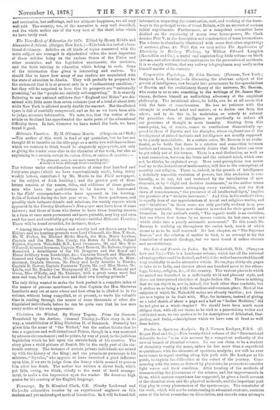Comparative Psychology. By John Bascom. (Putnam, New York ; Sampson
Low, London.)—In discussing the abstruse subject of the growth of intelligence, now brought into prominence by the speculations of Darwin and the evolutionary theory of the universe, Mr. Bascom, who seems to us to owe something to the writings of Dr. James Mar- tineau, declares himself an unflinching adversary of the empirical philosophy. The intuitional alone, he holds, can be at all reconeile4 with the facts of consciousness. Ho has no patience with the attempts to confound mind and matter, or to derive one from the other ; and to do this is, he maintains, so utterly to subvert the primitive data of intelligence as practically to reduce all our processes of thought to mere insanity. Starting from this stand-point, he, of course, comes to conclusions diametrically op- posed to those of Darwin and his disciples, whose explanations of the development of Animal instincts and intelligence aro usually supposed to bo purely materialistic. In a certain sense, Mr. Bascom is an evolu- tionist, as ho holds that there is a relation and connection between instinct and reason, but ho strenuously denies that the latter can ever be got solely out of the former. There is a real distinction, as well as a real connection, between the brute and the rational mind, which can- not, be thinks, be explained away. Mere semi-perceptions can never lead up to the deductions of mathematics, still loss to the conceptions of morality and religion. There is, indeed, in the growth of intelligence a definitely traceable evolution of powers, but this evolution is con- tinually, so to say, fed and sustained by the introduction of now elements, or by "slight and decisive increments," as the author terms them. Such increments accompany every variation, and the first dawn of consciousness," the precursor of all intellectual light," implies the presence of a " decisive increment." And this, in the author's view, is equally true of our apprehensions of moral and religious truths, and our intuitions" in these cases are only partially evolved from pre- existing materials. Some new element is needed for their growth and formation. In our author's words, " The organic world is an evolution, but one whose first terms by no means contain its last ones, nor one which sinks into a purely automatic movement." To this result Mr. Bascom is working up throughout the entire book, much of which seems to us to be well reasoned. Its last chapter, on " Tho Supremo Reason " and the relation of matter to God, is an attempt to lay the foundation of natural theology, but wo have found it rather obscure and unsatisfactory.


































 Previous page
Previous page